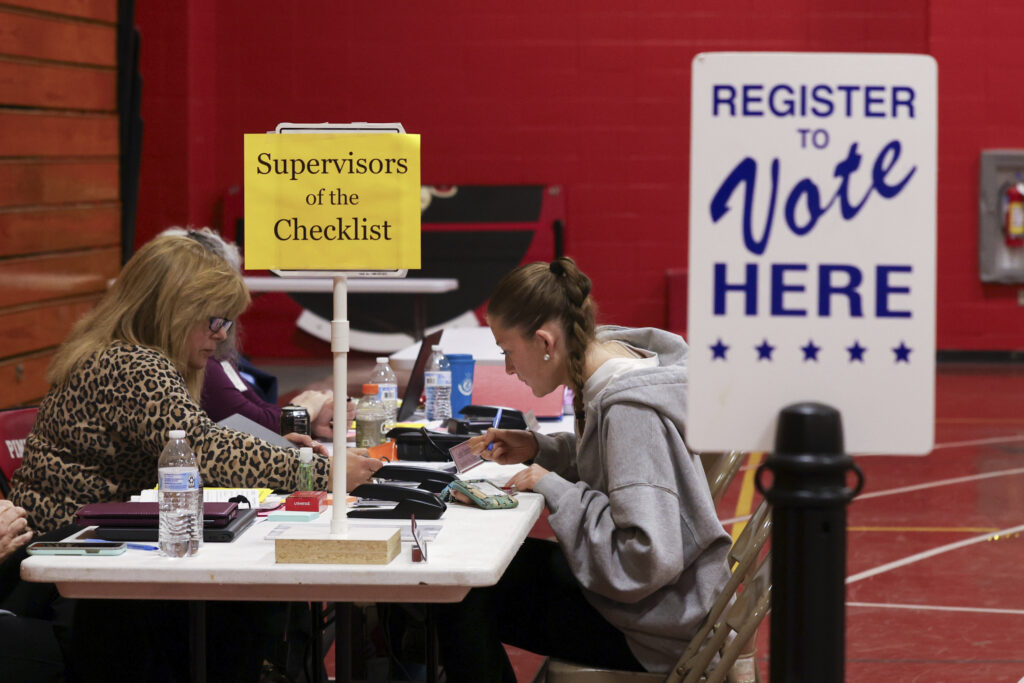Right Wing Groups Press Election Agency on Proof Citizenship Rule for Voter Registration

Right-wing groups are mobilizing activists to pressure a top federal voting agency to require documentary proof of citizenship on the federal voter registration form.
It’s the latest tactic by anti-voting groups to impose a proof of citizenship requirement for people to register to vote — a restriction that could keep large numbers of potential new voters off the rolls.
After federal courts told President Donald Trump he couldn’t directly order the U.S. Election Administration Commission (EAC) to require documentary proof of citizenship on its voter registration forms, America First Legal (AFL), a right-wing legal group founded by Stephen Miller, petitioned the independent agency to do it anyway.
And now, roughly halfway through the public comment period on that proposal, almost all of the more than 1,000 submissions urge the commission to adopt the proof of citizenship requirement. The comments appear to have been mobilized by a handful of anti-voting groups.
AFL’s petition, filed in July, asks the EAC to add the proof of citizenship requirement to the national mail voter registration form, the standard application for federal election registration. The EAC opened the petition for public comment August 21 and it will close October 20.
The AFL request mirrors the executive order Trump signed in March that purported to direct the EAC, an independent agency, to require a photo-ID citizenship check when someone registers to vote. Courts quickly blocked that provision in the executive order.
Both the AFL request and Trump’s order go further than the SAVE Act, the sweeping voter suppression bill passed earlier this year by the House, as well as most state measures to require proof of citizenship. Those would allow voter registrants to show a birth certificate to prove citizenship.
AFL encouraged its followers and allies to submit comments supporting the petition.
Democracy Docket reviewed the 1,088 public comments available for download as of Monday.
A few are prominent anti-voting activists at the state level.
Patrice Johnson wrote in support of the proposal, under the name of one of her anti-voting groups, the Michigan Fair Elections Institute, adding that another group she leads, Pure Integrity Michigan Elections, also backed it. And Jim Womack offered his support on behalf of the North Carolina Election Integrity Team, a chapter of Cleta Mitchell’s Election Integrity Network (EIN).
Another EIN affiliate, Tennessee Fair Elections, likewise urged the EAC to take up a rulemaking, writing: “Non-citizen voting, even if rare, undermines public confidence in election outcomes.”
Most comments so far are short statements in support, along the lines of Erik Kocher of Glen Mills, Pennsylvania. “REQUIRE PROOF OF CITIZENSHIP TO VOTE!” Kocher wrote. A few ran hundreds of words long.
Noncitizen voting is exceedingly rare. An audit by the Republican Secretary of State in Georgia last year found 20 noncitizens out of 8.2 million registered voters, or 0.00024%. In Texas, a review of 18.6 million registrations between 2021 and 2024 identified just 581 noncitizens, or 0.00003%. In Alabama, election officials cancelled registrations of 3,251 individuals suspected of being noncitizens in 2024, but then later acknowledged at least 2,000 were in fact eligible voters. A database of proven election fraud cases since 1982 maintained by the Heritage Foundation finds just 98 cases of alien ineligible voting across the entire U.S.
A few comments did urge the EAC to reject the proposal. One anonymous submitter argued that a proof of citizenship requirement would unduly burden physically handicapped voters who “may be less likely to need a license or U.S. passport because they may not be physically able to drive or travel.”
“Our elections are already secure—this is voter suppression,” Kurt Allebach wrote in opposition.
Some people made multiple comments and 231 comments were submitted anonymously. A few comments included allusions to far right conspiracy theories, like Q-Anon’s “WWG1WGA” or United4Freedom’s claims that 30 million U.S. voter registrations are defective.
The number of rulemaking comments has ballooned in recent years, powered by the ease of mass-email appeals campaigns. Commenters are not required to provide their name or contact information, but may do so if they desire. Some very high-profile rulemakings attract millions of public comments, but even more obscure proposals can garner thousands of statements. Research suggests that public comments can still exert some influence on the agency’s regulatory decision making.
The petition specifically asks for applicants to submit one of the following as proof of citizenship: a U.S. Passport, state-issued Real ID-compliant driver’s license indicating that the applicant is a citizen, an official military identification card noting citizenship, or a valid federal or state government-issued photo identification showing citizenship.